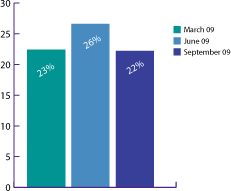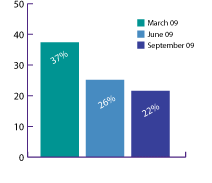|
Paola Sapienza and Luigi Zingales1
October 19, 2009 – Trust in America’s financial system continues to edge upward according to the latest quarterly findings in the Chicago Booth/Kellogg School Financial Trust Index. According to the report, the Financial Trust Index has increased slightly from 21 percent to 22 percent for the period from July to September 2009.
Most notably, the researchers attributed the positive trend to increased confidence in mutual funds and large corporations, and an overall stable view of the stock market.
FINANCIAL TRUST INDEX: KEY FINDINGS
Seeking to formalize the relationship between trust and finance, Sapienza and Zingales analyzed data from more than 1,000 American households, randomly chosen and surveyed via phone during two weeks in late September 20092.
Stock Market
“Last quarter we reported that consumers felt less fearful of a large drop in the stock market, and this trend is continuing. Forty percent of people surveyed in this issue of the Index think a big drop is likely as compared to 56 percent in December 2008,” said Sapienza. “In fact, our latest wave of data shows that fewer people think the market is undervalued compared to the June report, and the majority of people surveyed this quarter said they are planning to leave their stock market investments unchanged.”
Respondents were asked, “In the next few months are you planning to … your investment in the stock market?”
|
 |
|
| |
Respondents were asked, “In your opinion, what is the likelihood that the stock market will drop by more than 30 percent in the next 12 months?”
|
 |
|
| |
Respondents were asked, "Do you think that currently the stock market is…?" |
 |
|
| |
Banks
The researchers also cited a change in attitude toward banks. While overall trust in banks and bankers has decreased slightly (33 percent in September 2009 versus 34 percent in June 2009), trust in banks is still up compared to 29 percent in March 2009. Additionally, the authors noted that trust in bank organizations varies dramatically based on the type of bank, with the most support for institutions serving consumers at a local level.
Average response on a scale from 1 to 5 to the question, “How much do you trust …” where 1 means “I do not trust at all” and 5 means “I trust completely.”
Click on the graph to enlarge |
 |
|
| |
“Consumers surveyed put most of their trust in credit unions, which have a 65 percent approval rating versus 33 percent for national banks. Right now, credit unions have the highest level of trust compared to any institution we measure, though local or community banks also score much better than national banks with a 55 percent approval rating,” Zingales said.
Despite an overall positive feeling toward local banking institutions, banks in which the government has a stake are trusted the least, with only a 25 percent approval rating. The researchers said this is one symptom of a shift in opinion of government intervention in the financial system.
“As people begin to feel more sure of their personal investments, their banking institutions and corporations, the demand for regulation and government intervention is starting to subside,” said Sapienza.
Regulation and the Obama Administration
The Financial Trust Index reported drops in support for several areas of proposed government policy by the Obama administration. For example, supporters of regulation for financial institutions went down from 65 percent in June 2009 to 54 percent in September 2009. Likewise, supporters of caps on executive compensation dropped from 65 percent to 59 percent, and supporters of help for homeowners dropped from 68 percent to 54 percent.
“We discovered that 49 percent of those surveyed believe the Obama administration’s economic policies were designed with the country’s best interests in mind, while 23 percent think they were designed in favor of the unions and 22 percent believe they favored the financial industry,” Sapienza noted.
Housing and Job Markets
Finally, the latest findings also explored perceptions of both the housing and job markets over the last three months.
“According to the survey, the perceived chance of becoming unemployed has dropped from one out of four in June 2009 to one out of five now,” said Zingales. “And, we are seeing improvement on the housing front as well: 30 percent of people surveyed expect to see appreciation in house prices over the next 12 months, versus 28 percent in June and 19 percent in March. Similarly, fewer people think there will be a decline in home values, down to 23 percent from 37 percent six months ago.”
Respondents were asked, “What do you think are the chances that you will lose your job during the next 12 months?”
|
 |
|
| |
|
Respondents were asked, “In the next 12 months do you think house prices in your area will drop?”
|
 |
|
| |
|
1 Paola Sapienza is a Professor of Finance at the Kellogg School of Management at Northwestern University and Luigi Zingales is the Robert McCormack Professor of entrepreneurship and finance at the University Of Chicago Booth School Of Business.
2 The survey was conducted using ICR's weekly telephone omnibus service. It used a fully replicated, stratified, single-stage random-digit-dialing sample of landline telephone households |

